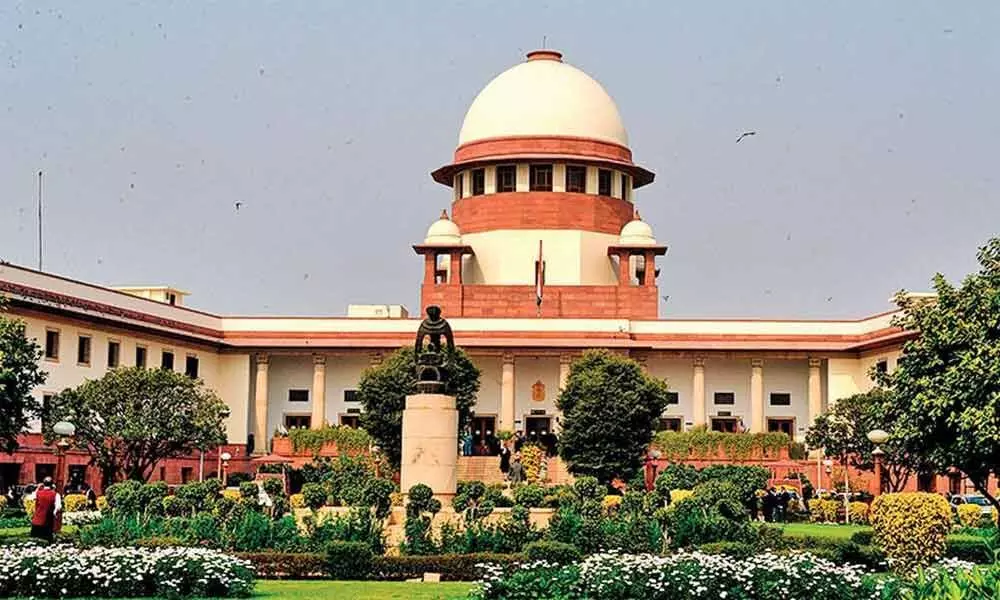Live
- All you need to know about PAN 2.0
- Akasa Air redefines travel experience with industry-first offerings
- MP: Residents stage protests against liquor shop in Indore
- Telugu Actor Shri Tej Booked for Alleged Cheating and False Promise of Marriage in Live-in Relationship
- Toyota Kirloskar Motor Celebrates 1 Lakh Urban Cruiser Hyryder on Indian Road
- MLS: New York City FC part ways with head coach Nick Cushing
- Delhi CM says Centre cutting AAP voters’ names from rolls, BJP hits back
- Hyderabad Metro Rail Phase-II Works to Begin in Old City in January 2025
- Odisha: 668 persons killed in human-elephant conflicts in last three years
- DEFENDER JOURNEYS: TO EMBARK ON ITS THIRD EDITION FROM NOVEMBER 2024
Just In
Consider imposing lockdown to curb 2nd wave of Covid: Supreme Court to Centre, states


Supreme Court
In the wake of the second wave of Covid-19, the Supreme Court on Monday directed the central and state governments to consider enforcing a ban on mass gatherings and super spreader events as well as consider imposing a lockdown
New Delhi: In the wake of the second wave of Covid-19, the Supreme Court on Monday directed the central and state governments to consider enforcing a ban on mass gatherings and super spreader events as well as consider imposing a lockdown.
"We would seriously urge the central and state governments to consider imposing a ban on mass gatherings and super spreader events. They may also consider imposing a lockdown to curb the virus in the second wave in the interest of public welfare," the Supreme Court said.
"Having said that, we are cognizant of the socio-economic impact of a lockdown, specifically, on the marginalised communities. Thus, in case the measure of a lockdown is imposed, arrangements must be made beforehand to cater to the needs of these communities," the apex court added.
The SC also has asked the Central and state governments to put on record their efforts taken so far to curb the spread of the deadly virus which has so far infected 1,99,25,604 with 34,13,642 active cases and a total of 2,18,959 deaths.
The top court further asked the Centre and the states to inform it about the measures that they have planned to deal with the global disease in the near future.
Considering Covid-19 crisis, the court then directed that "no patient shall be denied hospitalisation or essential drugs in any state or Union Territory for lack of local residential or identity proof".
A bench headed by Justice D.Y. Chandrachud issued the directive that the central government should formulate a national policy on admissions to hospitals within two weeks.
The judge said that the policy should also be followed by all state governments and that no patients till then will be denied admission or essential drugs in absence of local residential or identity proof.
The Supreme Court's order noted that getting admission in hospital with a bed is one of the biggest challenges being faced by thousands of people across the country since the beginning of the second wave of the Covid pandemic.
The top court observed that citizens have been suffering immeasurable hardship.
"Different states and local authorities follow their own protocols. Differing standards for admission in different hospitals across the nation leads to chaos and uncertainty. The situation cannot brook any delay," it said.
"Accordingly, we direct the central government to frame a policy in this regard, in exercise of its statutory powers under the Disaster Management Act, which will be followed nationally. The presence of such a policy shall ensure that no one in need is turned away from a hospital, due to no fault of their own."
In its order released late Sunday night, the Supreme Court had also directed that the central government to create a buffer stock of oxygen in collaboration with state governments to ensure supply lines continue to function even in unforeseen circumstances and decentralise the location of the emergency stocks.

© 2024 Hyderabad Media House Limited/The Hans India. All rights reserved. Powered by hocalwire.com






